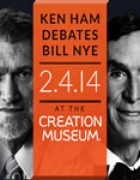The fallacies you see below are a brief list I have compiled over the course of several years. They are based upon common statements that are made within Christianity; whether in the context of a sermon, book, theologian, or conversation. This list is not exhaustive and will be updated periodically. The fallacies are based upon at least of the following criteria:
- Wording of the statement
- Meaning of the statement
- Logic of the statement
Fallacy 1: The Bible is the inerrant Word of God.
Fallacy 2: The Bible is inspired, therefore it is also inerrant.
Fallacy 3: Truth (or the Bible) has to be absolute (AKA Biblical Truth cannot be subjective).
Fallacy 4: If the Bible is not completely reliable, then we cannot trust anything it says (AKA If any part of scripture is false, then it can’t be true.)
Fallacy 5: There are no contradictions in scripture.
Fallacy 6: The Bible is the sole moral standard for living.
Fallacy 1: The Bible is the inerrant Word of God.
The most common definition as asserted by the Chicago Council on Biblical Inerrancy defines inerrancy: The Bible, in its original autographs, is entirely true and never false in everything it affirms.
Let’s look at the different pieces of this statement. The first part that stands out is “original autographs”. I will be honest; I am not sure why this part is in the statement. 98% of the Bible is accurate to its original autographs. Although we don’t have the actual papyrus, we do have the actual content. Moreover, why the actual papyrus is necessary as opposed to the content is puzzling.
It’s this second part that most get wrong: “…true in everything it affirms”. What this does NOT mean is “true in everything it says”. What it does mean is “true in everything that it says is true”. These are two different ideas. However, most define it in the former instead of the later sense.
There is an ambiguity about this though. For example, it could be argued that the ideas the Bible affirms as true are not necessarily historical (accurate dates, etc), but in the broader sense are simply the general ideas the Bible presents. For example, the Law would be considered an idea that the Bible affirms as true.
If, indeed the Bible is the Word of God, then I would agree that it would also have to be inerrant. However, please read my article: “The Bible is NOT the Word of God” to see why this is not the case.
Fallacy 2: The Bible is inspired, therefore it is also inerrant.
This is only necessarily true if God penned the Bible himself. The Bible can be inspired without needing to be inerrant. Inspiration simply refers to the creative process of writing, whereas inerrancy refers to the nature of the writing itself.
Fallacy 3: Truth (or the Bible) has to be absolute (AKA Biblical Truth cannot be subjective).
I am still surprised how often I hear this. I would like to think that this argument is most often recited by lay-people. Unfortunately it’s just as common among scholars. Regardless, this statement is fallacious.
Those who make this claim fail to make an important ontological distinction between the object and the subject and the relationship they have to truth. They also fail to appreciate the roles communication (more broadly) and language (more specifically) plays in the understanding of what is true.
First, the only way to obtain absolute truth is to be the source of that truth. Moreover, if God is absolute truth, then as both subject and object of that truth; he is the only one who has the ability to perceive that truth. Any attempt at ascertaining that truth outside of His sphere always results in something less than its source.
In fact, I would argue that all absolutists are really closet subjectivists. I say this because the majority of people do accept subjective truth as normative by practicing it every day.
For example, is not one’s interpretation of the Bible an act of subjectivity?
Truth has to be understood in the relationship it has both to its source as well as its perception from the subject hoping to ascertain it.
Fallacy 4: If the Bible is not completely reliable, then we cannot trust anything it says (AKA If any part of scripture is false, then it can’t be true.)
Talk about throwing the baby out with the bathwater. First and foremost this question is a contradiction. Something cannot be both “complete” and “reliable” at the same time. For example, something can be false/lie/untrue and still be reliable. Reliability only requires a majority for it to obtain. In essence the question is saying that the Bible must be only reliable, but also completely true.
If this is in reference to the stricter sense, then see Fallacy #5.
Fallacy 5: There are no contradictions in scripture.
It’s not entirely clear if this statement is referring to the form or function of scripture.
If it’s related to the form and/or any type of contradiction, then this statement would be untrue as there are innumerable contradictions in the Bible. Just to name a couple compare Matthew 1:16 and Luke 3:23 and ask yourself the question, who is Joseph’s father? Also look at Acts 1:18 and Matthew 27:5-7 and ask yourself the question, how did Judas die?
You will find countless irrational explanations for every apparent contradiction; and although some might be justifiable, the majority of them are weak attempts at justifying an irrational doctrine.
Fallacy 6: The Bible is the sole moral standard for living.
A very common argument for the inerrant moral standard of the Bible is that without the Bible’s absolute standard, morality would be solely dictated by the individual. This is oftentimes referred to as “moral relativism”. The idea is that humans have no way to determine what is right or wrong (apart from the aid of some absolute standard)
This argument is completely incoherent. First, this assumes that no one could do “good” before the Bible was written, or in places where the Bible was not present. Second, the Bible is not exhaustive in its teaching of morality. Third, the purpose of the Bible is not to be a treatise on morality, but to reveal God through the testimony of man. That is not to say that there are not moral teachings; instead, that is not the Bible’s primary purpose.

























Heath Achatz
September 9, 2014Let me comment on another of your old posts, or ask another question, ” If these fallacies are to be believed for the traditional bible from their original writings, the Latin Vulgate to the king James version and onward; then how is it any different in relaying testimonies about God and people than the Book of Mormon, The Jehovah Witness Bible, and any other texts that might tell of people relating to God (say your blog or mine for instance)?”
Eric English
September 9, 2014Heath…greetings again.
Excellent question.
1. On the surface there is no difference between the bible and any other piece of literature. As I have said in other articles (The bible is not the word of God series in particular), it’s about what the Holy Spirit does with the text that matters. Even in a very theologically conservative sense most would say it is the Holy Spirit which brings about “illumination” within the believer.
2. However, I realize that you are commenting on something a little different in that your concern (if I am reading your question correctly) is with the authority of any given testimony. Perhaps, I can turn the question back to you and ask “how is anyone’s testimony any more valid than the person next to them”?
Lets use an example from church vernacular. If you have attended church for any length of time I am sure you have heard people say (and perhaps even yourself) “God is telling me…” or “I feel God wants me to…”.
Are any of these testimonies true? Perhaps some are and some are not, and yet it doesn’t stop the individual from asserting the bold claim that God has spoken to them in some direct way (either through feelings or thoughts).
E Christopher Reyes
April 9, 2016From the Egyptians the Christians stole the following from their religious Pagan literature:
“ …My creations are Eternal, and I am the Lord of years, and the Prince of Everlastingness…”~E.A. Budge, Egyptian Book of the Dead.
The Great Creator expresses himself, “I produced myself from the matter that I made.”
“Now after these things, I united my portions, and I weep over them, and man and woman come into being from the tears, which cometh forth from my eye.” ~E.A. Budge, Egyptian Book of the Dead.
Kephera is the God who is becoming, of which there can be no creation without destruction.
The Egyptians believed that nothing could be created without something being destroyed and vice versa.
“O Amen, O Amen, who are in Heaven.” ~Egyptian Book of the Dead Translation by E.A. Wallis Budge, cf. the Christian The Lord’s Prayer and Psalm 23. http://www.thenazareneway.com/index_egyptain_book_dead.htm
“With his own fingers” the Lord of Divine Speech [cf. with Biblical Exodus version], Lord of Maat [the Goddess Maat represents Truth, Law & Justice, Harmony and Order] he wrote the 42 sacred scrolls entitled “The Books of Thoth.”
These words appear on the walls of the Temple of Horus at Edfu. “I am the Living God, with the earth millions of years.” ~Awakening Osiris translated by Normandi Ellis.
The Egyptian God Åmen [the word men derives from the Egyptian word, ‘Amen:’ to abide, permanent] and represents the hidden and creative powers of God.
Amen is later joined with Ra to become Amen-Ra the Self-begotten or self-born, Creator and untiring Watcher. ~from the Egyptian Book of the Dead Translation by E.A. Wallis Budge.
“…Thou hast not departed as one dead, but as one living thou hast gone to sit upon the throne of Osiris.” ~from the Egyptian Book of the Dead Translation by E.A. Wallis Budge.
Åmen or Åmen-ra the source of life to all men and all things is pictured as a man with a beard.” ~from the Egyptian Book of the Dead Translation by E.A. Wallis Budge.
“I am yesterday, because I also know tomorrow.” ~from the Egyptian Book of the Dead.
“I am Yesterday, Today, and Tomorrow, and I have the power to be born a second time.” ~from the Egyptian Book of the Dead.
“I am the Lord of the men who are raised up; the Lord who comes forth out of darkness and whose forms of existence are of the house wherein are the dead.” ~from the Egyptian Book of the Dead Translation by E.A. Wallis Budge. http://www.sacred-texts.com/egy/ebod/
Shakespearre
January 21, 2018I may be late to the ball game, but in my research and life growing up in the church, I’ve come to completely different conclusions looking at the same things. I think it’s great for you to be scrutinizing and skeptical to a degree, but the Bible does stand to reason and just because something doesn’t make sense may reflect a lack of understanding on the part of the skeptic rather than flaw in context when context is considered, etc. Biblical illiteracy is a major problem when reading the Bible and alot of the criticisms of the Bible are just that. Though, there are many things that are unclear, but the only way for skepticism to ring true is to assume the worst, flat out reject what it says (unbelief), or to not further research the points in question. The Bible, and the teachings in the Bible, are true, but many interpretations of unclear statements/activities are not true. AKA: what the Bible teaches is true but what people say about it isn’t always true. If you really “meditate” or think about what the Bible claims, there is outside evidence in every field of study that we have in our known reality: Science, history, psychology, philosophy, astronomy, biology, etc. Dig a little deeper, but keep some skepticism as there are a few nuts out there for sure.
Shakespearre
January 21, 2018I may
be late to the ball game, but in my research and life growing up in the
church, I’ve come to completely different conclusions looking at the
same things. I think it’s great for you to be scrutinizing and skeptical
to a degree, but the Bible does stand to reason and just because
something doesn’t make sense may reflect a lack of understanding on the
part of the skeptic rather than flaw in content when context is
considered, etc. Biblical illiteracy is a major problem when reading the
Bible and alot of the criticisms of the Bible are just that. Though,
there are many things that are unclear, but the only way for skepticism
to ring true is to assume the worst, flat out reject what it says
(unbelief), or to not further research the points in question. The
Bible, and the teachings in the Bible, are true, but many
interpretations of unclear statements/activities are not true. AKA: what
the Bible teaches is true but what people say about it isn’t always
true. If you really “meditate” or think about what the Bible claims,
there is outside evidence in every field of study that we have in our
known reality: Science, history, psychology, philosophy, astronomy,
biology, etc. Dig a little deeper, but keep some skepticism as there are
a few nuts out there for sure.
vorbelutrioperbir
November 16, 2023Hello. excellent job. I did not expect this. This is a excellent story. Thanks!
Earle Lori
December 3, 2023I have not checked in here for a while since I thought it was getting boring, but the last few posts are great quality so I guess I will add you back to my daily bloglist. You deserve it my friend 🙂
chat to strangers
December 3, 2023wonderful post, very informative. I’m wondering why the other specialists of this sector do not understand this. You should continue your writing. I’m confident, you’ve a great readers’ base already!
cbd vape juice canada
December 5, 2023Good post however , I was wanting to know if you could write a litte more on this subject? I’d be very grateful if you could elaborate a little bit more. Many thanks!